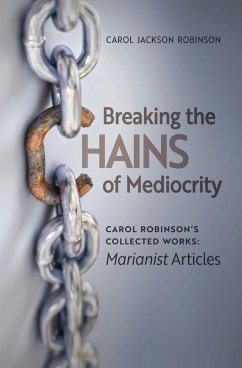Excerpt from the Introduction: The articles in this little book, Breaking the Chains of Mediocrity, will discomfort the complacent Catholic. Though written seventy years ago, their urgent call has not lost any relevance: the Catholic life does not consist in a mechanical, mediocre practice of the Faith-one that simply meets the minimum requirements of being a Catholic in "good standing"-but in a fully-realized Catholicism that penetrates into every facet of one's existence. Unabashedly Catholic, the ideas formulated in this work may well challenge the reader to confront his own spiritual mediocrity. Carol Jackson Robinson (1911-2002), wrote these five articles for the Marianist magazine at the beginning of her literary career, while she was as yet unmarried, and just several years after her conversion in 1941. Although she was still wrestling with how to view the world through a Catholic lens, she was at the same time co-editor, with Edward Willock, of the intrepid Catholic periodical, Integrity (Volume 1 of which is available from Arouca Press)....Robinson's diagnoses and prescriptions were conditioned by her time and place, but they remain valid for us today, because human nature and our conditions are fundamentally similar. Indeed, when Robinson writes of "perfecting men and their talents rather than deadening the human thing in the interests of mechanical monsters," can we not say today, having witnessed the brutalizing effects of systems that do not allow for this perfection, that her words were prescient?
Bitte wählen Sie Ihr Anliegen aus.
Rechnungen
Retourenschein anfordern
Bestellstatus
Storno








